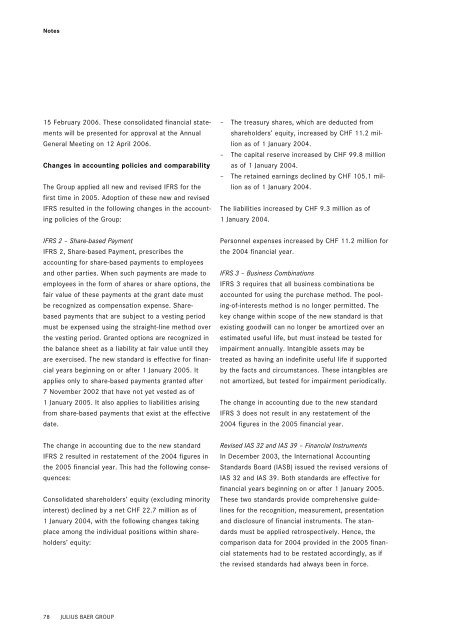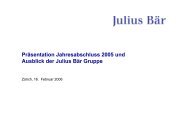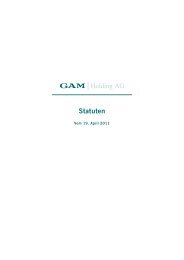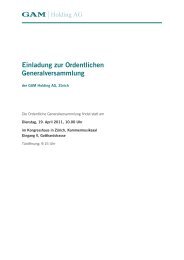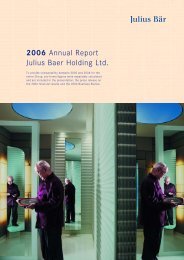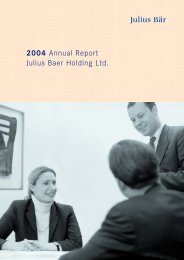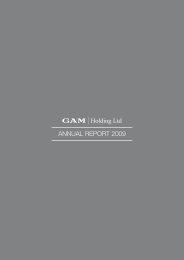2005 Annual Report Julius Baer Holding Ltd. - GAM Holding AG
2005 Annual Report Julius Baer Holding Ltd. - GAM Holding AG
2005 Annual Report Julius Baer Holding Ltd. - GAM Holding AG
Create successful ePaper yourself
Turn your PDF publications into a flip-book with our unique Google optimized e-Paper software.
Notes<br />
15 February 2006. These consolidated financial statements<br />
will be presented for approval at the <strong>Annual</strong><br />
General Meeting on 12 April 2006.<br />
Changes in accounting policies and comparability<br />
The Group applied all new and revised IFRS for the<br />
first time in <strong>2005</strong>. Adoption of these new and revised<br />
IFRS resulted in the following changes in the accounting<br />
policies of the Group:<br />
IFRS 2 – Share-based Payment<br />
IFRS 2, Share-based Payment, prescribes the<br />
accounting for share-based payments to employees<br />
and other parties. When such payments are made to<br />
employees in the form of shares or share options, the<br />
fair value of these payments at the grant date must<br />
be recognized as compensation expense. Sharebased<br />
payments that are subject to a vesting period<br />
must be expensed using the straight-line method over<br />
the vesting period. Granted options are recognized in<br />
the balance sheet as a liability at fair value until they<br />
are exercised. The new standard is effective for financial<br />
years beginning on or after 1 January <strong>2005</strong>. It<br />
applies only to share-based payments granted after<br />
7 November 2002 that have not yet vested as of<br />
1 January <strong>2005</strong>. It also applies to liabilities arising<br />
from share-based payments that exist at the effective<br />
date.<br />
The change in accounting due to the new standard<br />
IFRS 2 resulted in restatement of the 2004 figures in<br />
the <strong>2005</strong> financial year. This had the following consequences:<br />
Consolidated shareholders’ equity (excluding minority<br />
interest) declined by a net CHF 22.7 million as of<br />
1 January 2004, with the following changes taking<br />
place among the individual positions within shareholders’<br />
equity:<br />
78 JULIUS BAER GROUP<br />
– The treasury shares, which are deducted from<br />
shareholders’ equity, increased by CHF 11.2 million<br />
as of 1 January 2004.<br />
– The capital reserve increased by CHF 99.8 million<br />
as of 1 January 2004.<br />
– The retained earnings declined by CHF 105.1 million<br />
as of 1 January 2004.<br />
The liabilities increased by CHF 9.3 million as of<br />
1 January 2004.<br />
Personnel expenses increased by CHF 11.2 million for<br />
the 2004 financial year.<br />
IFRS 3 – Business Combinations<br />
IFRS 3 requires that all business combinations be<br />
accounted for using the purchase method. The pooling-of-interests<br />
method is no longer permitted. The<br />
key change within scope of the new standard is that<br />
existing goodwill can no longer be amortized over an<br />
estimated useful life, but must instead be tested for<br />
impairment annually. Intangible assets may be<br />
treated as having an indefinite useful life if supported<br />
by the facts and circumstances. These intangibles are<br />
not amortized, but tested for impairment periodically.<br />
The change in accounting due to the new standard<br />
IFRS 3 does not result in any restatement of the<br />
2004 figures in the <strong>2005</strong> financial year.<br />
Revised IAS 32 and IAS 39 – Financial Instruments<br />
In December 2003, the International Accounting<br />
Standards Board (IASB) issued the revised versions of<br />
IAS 32 and IAS 39. Both standards are effective for<br />
financial years beginning on or after 1 January <strong>2005</strong>.<br />
These two standards provide comprehensive guidelines<br />
for the recognition, measurement, presentation<br />
and disclosure of financial instruments. The standards<br />
must be applied retrospectively. Hence, the<br />
comparison data for 2004 provided in the <strong>2005</strong> financial<br />
statements had to be restated accordingly, as if<br />
the revised standards had always been in force.


